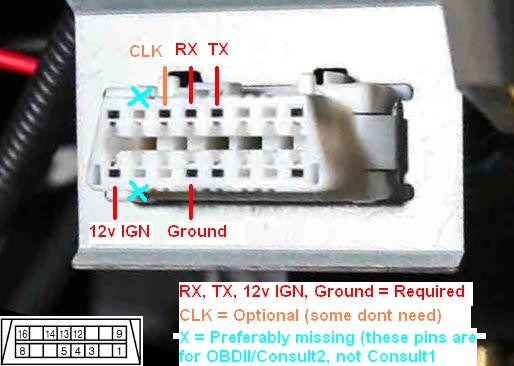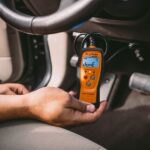Navigating the world of car diagnostics can be tricky, especially when you encounter terms like OBD2 and Nissan Consult. If you’re a Nissan owner, you might have found yourself scratching your head, wondering why your standard OBD2 scanner isn’t playing nicely with your vehicle, despite it having an OBD-style port. You’re not alone. Many Nissan owners have faced this exact issue, particularly with older models. Let’s dive into understanding this and explore the best пути to diagnose your Nissan.
It’s a common scenario: you’ve got a late 2003 Nissan Pulsar (or similar Nissan model), you see what looks like an OBD2 port, and you reach for your trusty, inexpensive Bluetooth OBD2 reader. But then, nothing happens. No connection, no data, just frustration. This is often because, despite the OBD2 port shape, your Nissan might be using the Nissan Consult protocol, a proprietary system Nissan used before the widespread adoption of OBD2.
Understanding Nissan Consult Protocol
Nissan Consult is Nissan’s proprietary diagnostic protocol, used in many of their vehicles from the late 1980s up to the early 2000s. Think of it as Nissan’s own language for communicating with the car’s computer (ECU). While OBD2 became a standardized protocol for vehicle diagnostics, Nissan, like many manufacturers, had their own system in place beforehand.
The confusion arises because some Nissan vehicles, especially during the transition period to OBD2, were equipped with OBD-style ports but still communicated using the older Nissan Consult protocol. This was, understandably, perplexing for many car owners and technicians alike.
Alt text: Nissan Consult Interface cable with OBDII style connector, used for diagnostic communication with older Nissan vehicles.
Why Your OBD2 Reader Might Not Work
Standard OBD2 readers are designed to communicate using standardized protocols like CANBUS, ISO9141, PWM, and VPW. If your Nissan is running on the Nissan Consult protocol, a generic OBD2 reader simply won’t understand the communication language. It’s like trying to speak English to someone who only understands Japanese – the physical connection might be there (the port), but the communication fails due to incompatible languages (protocols).
The pins within the OBD port are indeed crucial. While an OBD2 port has a standardized pin layout and communication method, the Nissan Consult system, even when using an OBD-style connector, may utilize different pins for data transmission or operate on a completely different communication standard. Therefore, simply adapting the pin layout won’t magically make a standard OBD2 reader understand the Consult protocol. It’s the underlying communication protocol that’s the barrier.
Options for Diagnosing Nissan Consult Vehicles
So, what are your options if you need to diagnose a Nissan vehicle that uses the Consult protocol but has an OBD-style port? Here are a few common approaches:
1. Nissan Consult to USB Adapters (like ECUTalk)
One established solution is using a dedicated “Nissan Consult to USB” adapter cable. The ECUTalk USB cable, as mentioned in the original post, is a popular example. These cables are specifically designed to bridge the gap between your Nissan’s Consult protocol and your computer via a USB connection.
Alt text: ECUTalk USB Cable featuring an OBDII connector, designed for Consult protocol communication in select Nissan models.
Pros:
- Protocol Compatibility: These adapters are built specifically for Nissan Consult, ensuring proper communication with your vehicle’s ECU.
- Functionality: Often, they come with or are compatible with software that allows you to not only read and clear fault codes but also perform more advanced functions like relearning procedures and live data monitoring.
- Reliability: Brands like ECUTalk are known for their reliability and are often recommended by Nissan enthusiasts.
Cons:
- Cost: As highlighted in the original post, these dedicated cables can be more expensive than generic OBD2 readers. The price point might be a barrier for users who only occasionally need to diagnose their vehicle.
- Specific to Consult: These cables are primarily designed for Nissan Consult protocol and may not work with standard OBD2 vehicles.
2. Nissan Data Scan Software
Software like Nissan Data Scan (NDS) is crucial when using a Consult adapter. This software is specifically designed to communicate with Nissan ECUs using the Consult protocol. NDS, often used in conjunction with a Consult to USB cable, unlocks the diagnostic capabilities you need, allowing you to:
- Read and clear diagnostic trouble codes (DTCs).
- Monitor live engine parameters (like temperature, RPM, sensor readings).
- Perform active tests and relearning procedures.
3. Professional Diagnostic Scanners
Professional-grade diagnostic scanners used by mechanics typically have broader protocol support. These advanced scanners are often capable of communicating with both OBD2 and older protocols like Nissan Consult. If you prefer a standalone device instead of a computer-based solution, a professional scanner might be an option.
Pros:
- Versatility: Supports multiple protocols and vehicle brands.
- Comprehensive Features: Usually offers a wide range of diagnostic and service functions.
- Standalone Operation: No need for a computer.
Cons:
- High Cost: Professional scanners are significantly more expensive than DIY solutions.
- Complexity: Can be more complex to use than simpler OBD2 readers or Consult-specific tools.
4. Exploring Budget-Friendly Options (and the Risks)
The original poster asked about cheaper alternatives, possibly from Chinese manufacturers. While the market is constantly evolving, and cheaper options might emerge, it’s crucial to exercise caution.
Potential Risks with Unverified Adapters:
- Incompatibility: Cheaper adapters might not reliably communicate with the Consult protocol, leading to inaccurate readings or no connection at all.
- Damage to ECU: In rare cases, poorly designed or manufactured adapters could potentially damage your vehicle’s ECU.
- Limited Functionality: Even if they connect, cheaper options might offer very limited functionality compared to established tools and software.
If considering a budget option, thorough research and reading user reviews are essential. Look for adapters specifically advertised as “Nissan Consult compatible” and ideally, find user feedback confirming their functionality with Nissan vehicles similar to yours.
CANBUS Compatibility and Nissan Consult
The original post also mentioned CANBUS compatibility. While CANBUS is a key protocol in OBD2, it’s generally not directly related to the Nissan Consult protocol. Nissan Consult is an older, different communication system. A standard OBD2 reader being CANBUS compatible won’t make it work with Nissan Consult.
However, later Nissan vehicles (typically post-2000s, depending on the model) transitioned to OBD2 and CANBUS. So, if you have a newer Nissan, it’s more likely to be truly OBD2 compliant and work with standard OBD2 scanners. The challenge lies with those transitional models that have the OBD port but use the older protocol.
Conclusion: Choosing the Right Path for Nissan Diagnostics
Diagnosing a Nissan vehicle that might be using the Consult protocol while having an OBD2 port requires understanding the nuances of Nissan’s diagnostic history. While a standard OBD2 adapter is excellent for OBD2 compliant cars, it won’t work for Consult-based Nissans.
For reliable diagnostics on these vehicles, investing in a dedicated Nissan Consult to USB adapter and compatible software like Nissan Data Scan is generally the recommended approach. While exploring cheaper options might be tempting, carefully weigh the potential risks against the cost savings. Ensuring proper communication with your car’s computer is paramount for accurate diagnosis and avoiding potential issues.
Ultimately, the “best” option depends on your budget, technical comfort level, and how frequently you need to diagnose your Nissan. For DIY enthusiasts and Nissan owners who want comprehensive diagnostic capabilities, a Consult adapter and NDS software offer a robust and reliable solution.

